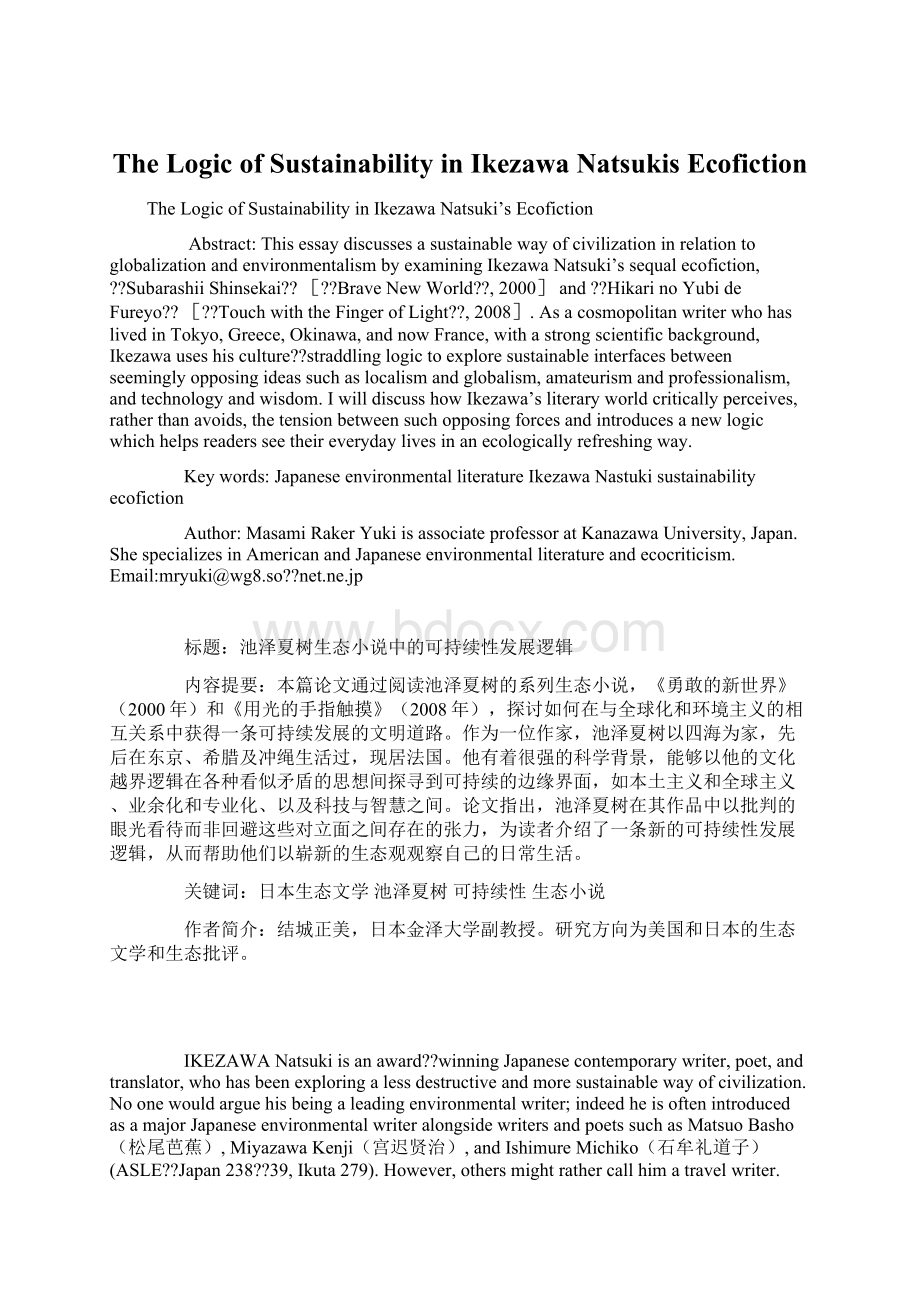The Logic of Sustainability in Ikezawa Natsukis Ecofiction.docx
《The Logic of Sustainability in Ikezawa Natsukis Ecofiction.docx》由会员分享,可在线阅读,更多相关《The Logic of Sustainability in Ikezawa Natsukis Ecofiction.docx(8页珍藏版)》请在冰豆网上搜索。

TheLogicofSustainabilityinIkezawaNatsukisEcofiction
TheLogicofSustainabilityinIkezawaNatsuki’sEcofiction
Abstract:
ThisessaydiscussesasustainablewayofcivilizationinrelationtoglobalizationandenvironmentalismbyexaminingIkezawaNatsuki’ssequalecofiction,?
?
SubarashiiShinsekai?
?
[?
?
BraveNewWorld?
?
2000]and?
?
HikarinoYubideFureyo?
?
[?
?
TouchwiththeFingerofLight?
?
2008].AsacosmopolitanwriterwhohaslivedinTokyo,Greece,Okinawa,andnowFrance,withastrongscientificbackground,Ikezawauseshisculture?
?
straddlinglogictoexploresustainableinterfacesbetweenseeminglyopposingideassuchaslocalismandglobalism,amateurismandprofessionalism,andtechnologyandwisdom.IwilldiscusshowIkezawa’sliteraryworldcriticallyperceives,ratherthanavoids,thetensionbetweensuchopposingforcesandintroducesanewlogicwhichhelpsreadersseetheireverydaylivesinanecologicallyrefreshingway.
Keywords:
JapaneseenvironmentalliteratureIkezawaNastukisustainabilityecofiction
Author:
MasamiRakerYukiisassociateprofessoratKanazawaUniversity,Japan.ShespecializesinAmericanandJapaneseenvironmentalliteratureandecocriticism.Email:
mryuki@wg8.so?
?
net.ne.jp
标题:
池泽夏树生态小说中的可持续性发展逻辑
内容提要:
本篇论文通过阅读池泽夏树的系列生态小说,《勇敢的新世界》(2000年)和《用光的手指触摸》(2008年),探讨如何在与全球化和环境主义的相互关系中获得一条可持续发展的文明道路。
作为一位作家,池泽夏树以四海为家,先后在东京、希腊及冲绳生活过,现居法国。
他有着很强的科学背景,能够以他的文化越界逻辑在各种看似矛盾的思想间探寻到可持续的边缘界面,如本土主义和全球主义、业余化和专业化、以及科技与智慧之间。
论文指出,池泽夏树在其作品中以批判的眼光看待而非回避这些对立面之间存在的张力,为读者介绍了一条新的可持续性发展逻辑,从而帮助他们以崭新的生态观观察自己的日常生活。
关键词:
日本生态文学池泽夏树可持续性生态小说
作者简介:
结城正美,日本金泽大学副教授。
研究方向为美国和日本的生态文学和生态批评。
IKEZAWANatsukiisanaward?
?
winningJapanesecontemporarywriter,poet,andtranslator,whohasbeenexploringalessdestructiveandmoresustainablewayofcivilization.Noonewouldarguehisbeingaleadingenvironmentalwriter;indeedheisoftenintroducedasamajorJapaneseenvironmentalwriteralongsidewritersandpoetssuchasMatsuoBasho(松尾芭蕉),MiyazawaKenji(宫迟贤治),andIshimureMichiko(石牟礼道子)(ASLE?
?
Japan238?
?
39,Ikuta279).However,othersmightrathercallhimatravelwriter.Ikezawaisanavidtraveler,notonlyvisitingmanypartsoftheworldfromAfricatothePacificislands,butalsohavinglivedinmanyplacesincludingTokyo,Greece,Okinawa,andFrance,wherehecurrentlyliveswithhisfamily.Inadditiontophysicalmovement,Ikezawaseemsfascinatedwithconceptualmotion,traversingtheideologicaldistancesbetweendifferentdisciplines.Suchacosmopolitan,culture?
?
straddlingstancemakesIkezawa’sworkuniqueinJapan’sliteraryenvironmentalismwhichisoftencharacterizedbyastrongsenseofplace―ofrootednessinaparticularplace.ComparedtoAmericanliteraryenvironmentalismwhichhasatendencytohighlighttheimplicationsofasenseofplace,“Japanesewriters...donotseemtohaveanytroublelocatingthissenseinwhattheywrite.Or,rather,thesenseofplacehasbeensoacknowledgedbywritersassomethinginherentintheJapanesementalitythatsometimestheyarenotevenawarethatitislatentintheirownwriting”(Ikuta277).Ratherthanfocusingonandcelebratingthepoeticsofhumanconnectednesstoaparticularplace,Ikezawa’scompoundperspectiveseesaplaceandthehumaninteractionwiththeenvironmentinitinamoreobjectiveandcomparativemanner.
Apopularwriterandintellectualwhohasreceivedseveralprestigiousliteraryawards,Ikezawahasattractedgeneralandscholarlyreaders,withinandbeyondJapan.However,asfarasIknow,therehasnotyetbeenanyecocriticalresearchfocusingonhiswork.ItmayhavesomethingtodowiththeacademiccircumstancesofecocriticisminJapan.SincetheintroductionofecocrticismintoJapan’sacademicrealminthemid1990s,ithasbeenpracticedmainlybyAmericanists,nothavingbeenverysuccessfulinattractingtheattentionofJapaneseliteraryscholars.InadditiontotheunsuccessfulmarriagebetweenAmerican?
?
bornecocriticismandJapaneseliterarystudy,theremightbesomeotherreasonsforthelimitedecocriticalattentiontoIkezawa’swork.IamnotascholarofJapaneseliteraturebyprofessionmyself,yetusingwhatIhavelearnedinthestudyofAmericanliteraryenvironmentalism,IhaverecentlyattemptedtoapplyecorticialtheoryandmethodologytothereadingofJapaneseliteraryworkssuchasthoseofIshimureMichiko,MorisakiKazue,andTaguchiRandy.Inthisessay,IwishtoillustratehowIkezawa’sculturalpluralisticpositionintroducesauniqueperspectivetoliteraryenvironmentalisminJapan.
ACulturalStraddler
Inhisnonfictionessayssuchasthosecollectedin?
?
Hahanarushizennooppai?
?
[?
?
MotherEarth’sBreast?
?
1996],andnovelsincluding?
?
Subarashiishinsekai?
?
[?
?
BraveNewWorld?
?
2000]and?
?
Hikarinoyubidefureyo?
?
[?
?
TouchwiththeFingerofLight?
?
2008],thereisadistinctivetendencytotraversedifferentculturesphysicallyandconceptually.AsIhavementioned,Ikezawahimselfisatraveler,acosmopolitanwhohaslivedinmanydifferentplaces,andadecompartmentalizedintellectualwhofreelygoesbackandforthbetweenpoeticsandscience.Butforwhatdoeshe(andthecharactersofhiswork)travelsoconstantly?
OneconceivablereasonisthatlocatinghimselfoutsideJapanmakesitpossibleforhimtoseehowadominantdiscourseframesindividualandsocietalattitudesregardingtheirsurroundingworldandthereinhowtoputtheminperspective.Astheproverbsays,inaforest,onecannotseetheforest;acertaindistanceisnecessaryifonewishesto.Travel―bothphysicalandconceptual―isthemosteasilyaccessiblewayofkeepingadistancefromtheplaceandissuesinquestion.
Inhisstrongdesirefordifferentframesofreference,asIhavestated,IkezawaisuniqueinJapan’sliteraryenvironmentalisminwhichalivedsenseofplaceandaresultantplace?
?
basedliterarystancearethoughttobethemajorelements.However,thatdoesnotmeanthatthereisnoliteraryprecedent;MatsuoBashoisknownasawonderingpoetandMiyazawaKenjieasilystrolledbetweenhumanitiesandscience.Inaddition,increasingattentionhasbeengiventonon?
?
placedwriterssuchasHinoKeizo(日野启三)andMorisakiKazue(森崎和江),whowerebothraisedinKoreaduringJapan’soccupationandhavedevelopedcriticalviewsfromwhichtheydeconstructtheculturalmatrixofJapanandreconsiderthecultural,political,andaestheticimplicationsofitshumanrelationshipswiththeenvironment.Itisinsuchaliterarylineageoftraveling/non?
?
placednessthatIkezawa’sworkshouldbesituated.Still,though,hisworkisremarkableinthedepthofhismovementinthephysicalandconceptualworlds.
Visitinganunfamiliarplaceoftenbringsaboutanencounterwiththeother―awayofbeing,thinking,acting,livingthatisfundamentallydifferentfromone’sown―whichmaydisturbandtherebyhelpexpandone’sworldview.LookingforsuchakeyfunctionofcontactwiththeothermaybeanotherreasonwhyIkezawatravelssoavidly.Ishouldmakeitclearthat,unlikethecolonialisticdesirefortheother,whichcharacteristicallyinvolvesahierarchicalbinarydifferencebetweenselfandotheraswellasthatofcenterandperiphery,Ikezawa’sattitudetowardstheothershowsnointentiontointervene.Evenintheearlieststageofhisliterarycareer,itisevidentthatthewriterisawareofthedisparatenatureoftheotherandunderstandstheworld’sindifferencetohim,asisclearlydemonstratedinthefollowingopeningpassagefromhis1987debutstory“StillLife”:
Youshouldn’tassumethatthisworldexistsforyourbenefit.Theworldisnotacontainerforyou.
Youandtheworldareliketwotreesstandingtogether.Neitherleansontheother;bothgrowerect.
Youareawarethatthesplendidtreewecalltheworldisbesideyou,andthismakesyouhappy.Butitmaybethattheworldisbarelyconcernedwithyouatall.(“StillLife”113;somemodificationsaddedtotheoriginaltranslation)
Unlikearomanticwriter,Ikezawadoesnotattempttodissolvethedifference,distance,split,gap,orwhateveryouwishtocallit,betweentheindividualandtheworld.Hedoesnotdreamoftranscending,ofunifying.Instead,hesuggests,“[what]mattersistheforgingoflinks,thepassingofmessagesbetweentheouterworldofmountains,people,factoriesandinsectssingingandthewideworldwithin.Evenwhileadistanceismaintainedbetweenthem,thereshouldbeasenseofworldsmovinginunisonorharmony”(“StillLife”113).Inordertopursueasoundrelationshipwiththeworld,heclaims,weneedaproperdistancefromit;distancedoesnotnecessarilykeeponeawayfromtheworldbutservesasavantagepointfromwhichtofindpassageforcorrespondencebetweendifferentworlds.ItisthisparadoxicalfunctionofdistancethatcharacterizesIkezawa’sliterarystance,fromwhichhecontemplatesabalanced,sustainablefuture.
SofarIhaveemphasizedIkezawa’sbeingatravelerinhiscriticalexaminationofsocialsituationsandhisliteraryexplorationofasustainablefuture,butheisnotjustcasuallypassingthroughdifferentplacesoneafteranother.Callinghimself“atravelerwhohasmissedhischancetoleave”(“ALongInterview”52),Ikezawastayslongenoughtolearnaparticularplace.BorninHokkaidoandraisedinTokyo,hewasinGreeceforthreeyearsinthemid1970s,andinTokyo,beforemovingtoOkinawain1994thentoFontainebleau,Francein2004.ItseemsthatIkezawafluctuatesbetweenlocalculturesandcosmopolitancultures,locatinghimselfsomewherebetweenanativeandasojourner,havingcontactwithbothbutidentifyingwithneither.Ikezawasituateshimselfinnoparticularculture,ornowhere,whichcanbetransformedintonow/her